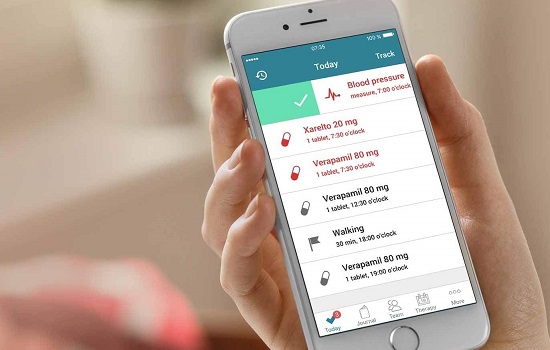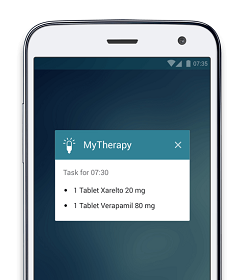Do You Have AFib? Here’s an App to Help You Manage Your Medication, Control Symptoms, and Live a Healthy Lifestyle
Atrial Defibrillation Can Be Treated. Learn How MyTherapy Can Help You Control Your AFib and Live a Normal, Healthy Life

Atrial fibrillation (also called AF or AFib) is characterized by an irregular and rapid heartbeat (arrhythmia). While the condition itself is not debilitating, it can have serious, life-threatening consequences like thrombosis (blood clots), strokes, heart failure, and other heart-related complications. Fortunately, several medications and procedures exist to control the symptoms of AFib. If you have AFib, it is important that you – together with your doctor – develop a personalized treatment and medication plan to minimize the risks and complications associated with the condition. However, the medication and treatment plan remain ineffective if you do not adhere to prescribed instructions. For many patients, adherence to medication and living a healthy lifestyle can be quite overwhelming at times. Furthermore, AFib can be asymptomatic, meaning that patients are either not aware of their condition or do not adhere to their treatment plan because they do not experience anything to make them feel that something is wrong . For these reasons, there are apps, such as MyTherapy, that make adherence much easier by reminding you to take your medication, encouraging you to keep track of your health, and helping you work with your doctor as effectively as possible.
In order to treat AFib effectively, medication is essential. Typically, AFib patients have to take two to three types of medications. These medications can include heart rate control medications to slow the heart rate, rhythm control medication to restore the heart’s normal sinus rhythm, and anticoagulants (blood thinners) to prevent strokes. It is critical not to skip these types of medications. For example, skipping anticoagulant medication can cause blood clots to develop in the heart, ultimately causing a stroke. The smartphone medication reminder and health tracker app, MyTherapy, is designed to help you, the patient, adhere to your life-saving medication. The app’s medication reminders help you take the right dose at the right time and scheduling your reminders is as easy as scanning the barcode of your medication’s packaging. Moreover, MyTherapy can be used as an AFib health diary, which you can use to track your symptoms, blood pressure, medication side-effects, and your weight, for example. The data you record in the app can then be given to your doctor in the form of a monthly health report generated by the app to help him/her see how you are doing with treatment. The app also comes with a lab values feature that allows you to record important information from lab tests (such as cholesterol/ blood etc.). MyTherapy has been clinically tested and is proven to increase adherence rates. The app is easily usable for any patient of any age and is designed to give you peace of mind about your health.
Knowing and Recognising Afib
Atrial fibrillation (AF), which mustn’t be confused with atrial flutter, is a common heart condition that leads to an irregular and rapid heartbeat. This, in turn, increases the risk of life-threatening heart-related problems (stroke and heart failure, for example). During atrial fibrillation, the heart’s two upper chambers (the atria) beat irregularly and out of sync with the two lower chambers (the ventricles). This means that the heart muscle cannot relax between contractions, thereby reducing its efficiency and performance. The timing of the contractions is what pumps the blood around the body. Therefore, the heart is unable to keep up with the needs of the body because the blood isn’t being pumped around the body as it should.
The main symptoms of AFib include heart palpitations, shortness of breath, and weakness. Heart palpitations are sensations of a racing, fluttering, pounding, or flip-flopping against the chest. This feeling can last for a few seconds or even a few minutes. In addition to this irregular heartbeat, people may also notice an accelerated heartbeat. The resting heart rate of someone without AFib is usually between 60 and 100 beats per minute. For those with AFib, the resting heart rate is over 100 beats per minute. You can measure your heartbeat by tracking your pulse in your wrist or neck. Other symptoms of AFib include:
- Tiredness
- Feeling faint, light-headed, or dizzy
- Confusion
- Chest pain
- Reduced ability to exercise
It is also common for people with AFib not to experience any symptoms. People can also mistakenly attribute the symptoms to age-related weakness. In these cases, the abnormal heart rhythm may only be discovered via routine tests or screenings for other conditions. If you or your doctor suspect atrial fibrillation, an electrocardiogram (ECG) is carried out to confirm the diagnosis. This is a type of ultra-sound scan of the heart that can detect abnormalities in the structure and function of the heart valves. If you experience chest pain, it is critical to seek medical help urgently as chest pain can signal a heart attack.
Are You at Risk of Developing AFib?
Anyone can develop AFib, but the older you get, the greater the risk (especially in people over 60). There are various risk factors that make individuals more vulnerable to AFib and these include:
- Heart diseases like high blood pressure (hypertension), atherosclerosis, heart valve disease, congenital heart disease, and weakened heart muscle (cardiomyopathy)
- Other chronic conditions such as an overactive thyroid gland, pneumonia, asthma, chronic obstructive pulmonary disease (COPD), lung cancer, and diabetes
- Obesity
- Family history (or a genetic predisposition to developing AFib)
In addition to these risk factors, there are various triggers that can cause an episode of AFib. These include: - Drinking large amounts of alcohol, especially binge drinking
- Drinking large amounts of caffeine
- Taking illegal drugs, especially amphetamines or cocaine
- Smoking
- Viral infections
- Stress
AFib affects around 1.5 million people in the UK, 10 million in Europe, and up to 6.1 million in the USA.
Types of AFib
- Paroxysmal AFib. This is AFib that occurs occasionally and then stops. The AFib stops by itself and the heart then returns to its normal rhythm.
- Persistent AFib. This type does not stop by itself and medications and a special type of electrical shock are used to help the heart return to its normal rhythm.
- Long-standing Persistent. This is AFib that cannot be corrected and usually medications and controlled electrical shocks do not help the heart return to a normal rhythm.
Treatment: Medication and Lifestyle Adjustments
AFib is mostly treated with different types of medications and lifestyle adjustments such as getting plenty of rest, not overdoing it when exercising, and regular check-ups with your doctor. For each case of AFib, the specific drugs and treatment plan are chosen carefully together with a GP. The treatment plan will depend on several factors such as age, the cause of the AFib, symptoms, and medication side effects. There are three types of medication that exist for AFib:
- Drugs to control the heart rate. These drugs lower the heart rate (ideally under 90 beats per minute) by interfering with the electrical signals of the heart. They include beta-blockers (e.g. atenolol, propranolol), calcium-channel blockers (e.g. diltiazem, verapamil), and digoxin.
- Drugs to control the rhythm of the heart. These drugs reset the heart to its regular rhythm (sinus rhythm) using a procedure called cardioversion. There are two types of cardioversion: electrical and with medication. With electrical cardioversion, the heart is given an electrical shock, which stops the heart’s electrical activity momentarily. Both methods, however, tend to have limited success and are only used in some cases of AF.
- Drugs for anticoagulation. These drugs aim to prevent strokes by reducing the risk of blood clotting. A common anticoagulant is warfarin. Newer anticoagulants include rivaroxaban (Xarelto), dabigatran (Pradaxa), and apixaban (Eliquis). Unlike warfarin, these newer drugs do not interact with other medications and do not require regular blood tests.
Surgical treatments (like catheter ablation and pacemakers) are also an option, especially when the medication is unsuccessful. In catheter ablation, the faulty area of the heart is destroyed under general anesthetic. Pacemakers are implanted into the chest and help the heart beat regularly.
Your Health Journey with MyTherapy
With a personalized treatment plan that includes medication and a healthy lifestyle, the risks and complications of AFib can be reduced significantly. It is therefore essential for you, the patient, to adhere to your medication regimen strictly and responsibly. With MyTherapy, taking medication and tracking your health become simplified tasks. The app’s built-in AFib health diary makes it easier for you to track the course of your AFib treatment and discuss any concerns with your doctor. In addition to the medication reminders, MyTherapy also helps you to remember appointments with your doctors. These features, together with the user-friendly design, make the app a useful and practical companion in managing your AFib.


